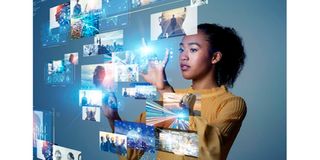Let’s not be a digital generation with caveman antics

The benefits of technology and innovation must always be juxtaposed against their effects on other aspects of life.
What you need to know:
- Can we call ourselves the sophisticated generation that is exposed to world civilisations and poised to bring change to this country if we still rely on rogue generalisations to interact with others?
- For some reason, a few of my readers have decided I am a man, they have also ascribed an ethnicity to me and, of course, the resulting characteristics of the tribe!
Preamble: Can we call ourselves the sophisticated generation that is exposed to world civilisations and poised to bring change to this country if we still rely on rogue generalisations to interact with others?
When I started writing #DaisysWorld about six months ago, I was excited to use the platform to engage with digitally savvy, ‘woke’ and intellectually awake youngsters. And for the most part, I am excited to always connect with insightful readers, engage with other schools of thought, and obviously get challenged.
Research upon research tells us that the younger generations are different from the older ones, right? We are innovative, we are multi-skilled, we are more interested in impact than money… and all the other nice things. In fact, Gen Zs are being credited with the potential to ‘revolutionise’ the workplace! Remarkable, right?
However, before we achieve these feats, which are by no means small, we have to address a few teething problems.
For some reason, a few of my readers have decided I am a man, they have also ascribed an ethnicity to me and, of course, the resulting characteristics of the tribe!
I find this surprising because all along I have assumed that as a ‘woke’ generation, we are not ethnocentric anymore, you know like we are the new phase of a united Kenya, interested in pushing for issue-based politics, focusing on socioeconomic development, plus other lofty ideas such as mechatronics and ChatGPT.
After all, aren’t we the digital generation that has grown up reading books, learning about other cultures, and, hopefully, understanding the intertwined identity of human beings better than the previous generations?
Some of the aggressive emails and comments that give me the male gender point to the topics I write about and my language. On the ‘topics issue’ – I think it is quite late in the day to explain to anyone that the topics writers are interested in are guided by many things – the gender of the writer may not always be a big part of that decision.
So, to expect that as a female writer, I will maybe only write about certain topics is puzzling, even to me. The world has since evolved.
What makes stereotyping a bigger problem is just how pervasive it is. Every time I scroll through the comment section of many posts on social media (I belong to the famous Comments Readers Association), I am shocked at the bile, the amount of gender and ethnic stereotyping that mostly goes on there.
Apart from about a third or so of the comments, many people are keen on insulting people, rather than engaging with the issue before them.
We are human, a product of parents and communities, and, therefore, have certain world views. However, as Maya Angelou would say: “When you know better, do better.”
Once you are privileged to access education, meet people from different places, and read widely, revising opinions is a good idea. Of what use is our education, really, if our reasoning cannot be distinguished from that of those who did not have a chance at an education?
As a journalist, I am alert to the issue of cyberbullying, and the ‘cancel culture’, including Internet scamming and hacking. The point here is not that you agree with everything someone writes.
The point is recognising that at the end of your tweet or IG post is an actual human being. It is absolutely possible to disagree, differ and critique without being crass.
Stereotypes breed prejudice. If they go unchecked, they can easily keep us from interacting with content, facts, and realities before us in a way that builds us socially, economically, and professionally.
Self-awareness is key to helping us see beyond the ethnic, class, and gender programming we received when we were 10 years old.
Our education and exposure to the world of the Internet need to count for something! In the words of the former president of South Africa, Nelson Mandela, “we slaughter one another in our words and attitudes. We slaughter one another in the stereotypes and mistrust that linger in our heads, and the words of hate we spew from our lips.”
The writer is the research editor, NMG ([email protected]).





